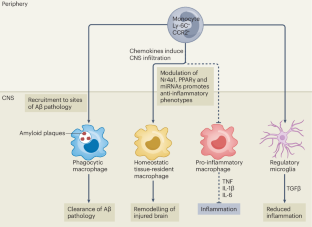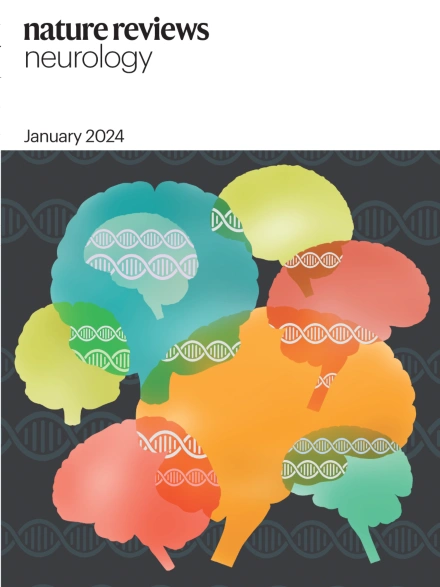神经退行性疾病的免疫机制和共享免疫靶点
IF 28.2
1区 医学
Q1 CLINICAL NEUROLOGY
引用次数: 0
摘要
免疫系统在神经退行性疾病中扮演着重要角色。在某些疾病中,如多发性硬化症,免疫系统是疾病的主要驱动力。而在阿尔茨海默病、肌萎缩性脊髓侧索硬化症和帕金森病等其他疾病中,免疫系统则起着放大作用。目前正在探索针对适应性免疫系统和先天性免疫系统的免疫治疗方法,以治疗几乎所有神经系统疾病,而且不同疾病的治疗目标和方法往往是相同的。小胶质细胞是大脑中的主要免疫细胞,对疾病的发病机制起着重要作用,因此也是常见的免疫治疗靶点。其他治疗方法的靶点是外周免疫系统的组成部分,如调节性 T 细胞和单核细胞,它们反过来又在中枢神经系统内发挥作用。本综述详细探讨了小胶质细胞、单核细胞和 T 细胞如何参与多发性硬化症、阿尔茨海默病、肌萎缩侧索硬化症和帕金森病的发病机制,以及它们作为这些疾病的共同治疗靶点的潜力。微生物组也被强调为间接调节免疫系统的新兴治疗靶点。讨论了针对神经退行性疾病的免疫功能而开发的治疗方法,强调了为治疗一种疾病而开发的基于免疫的方法如何适用于其他多种神经系统疾病。本文章由计算机程序翻译,如有差异,请以英文原文为准。


Immune mechanisms and shared immune targets in neurodegenerative diseases
The immune system plays a major part in neurodegenerative diseases. In some, such as multiple sclerosis, it is the primary driver of the disease. In others, such as Alzheimer disease, amyotrophic lateral sclerosis and Parkinson disease, it has an amplifying role. Immunotherapeutic approaches that target the adaptive and innate immune systems are being explored for the treatment of almost all neurological diseases, and the targets and approaches are often common across diseases. Microglia are the primary immune cells in the brain that contribute to disease pathogenesis, and are consequently a common immune target for therapy. Other therapeutic approaches target components of the peripheral immune system, such as regulatory T cells and monocytes, which in turn act within the CNS. This Review considers in detail how microglia, monocytes and T cells contribute to the pathogenesis of multiple sclerosis, Alzheimer disease, amyotrophic lateral sclerosis and Parkinson disease, and their potential as shared therapeutic targets across these diseases. The microbiome is also highlighted as an emerging therapeutic target that indirectly modulates the immune system. Therapeutic approaches being developed to target immune function in neurodegenerative diseases are discussed, highlighting how immune-based approaches developed to treat one disease could be applicable to multiple other neurological diseases. The immune system plays a major part in neurodegenerative diseases. In this Review, Weiner considers the contributions of several components of the immune system in multiple neurodegenerative diseases and their potential as shared therapeutic targets across these diseases.
求助全文
通过发布文献求助,成功后即可免费获取论文全文。
去求助
来源期刊

Nature Reviews Neurology
医学-临床神经学
CiteScore
29.90
自引率
0.80%
发文量
138
审稿时长
6-12 weeks
期刊介绍:
Nature Reviews Neurology aims to be the premier source of reviews and commentaries for the scientific and clinical communities we serve. We want to provide an unparalleled service to authors, referees, and readers, and we work hard to maximize the usefulness and impact of each article. The journal publishes Research Highlights, Comments, News & Views, Reviews, Consensus Statements, and Perspectives relevant to researchers and clinicians working in the field of neurology. Our broad scope ensures that the work we publish reaches the widest possible audience. Our articles are authoritative, accessible, and enhanced with clearly understandable figures, tables, and other display items. This page gives more detail about the aims and scope of the journal.
 求助内容:
求助内容: 应助结果提醒方式:
应助结果提醒方式:


